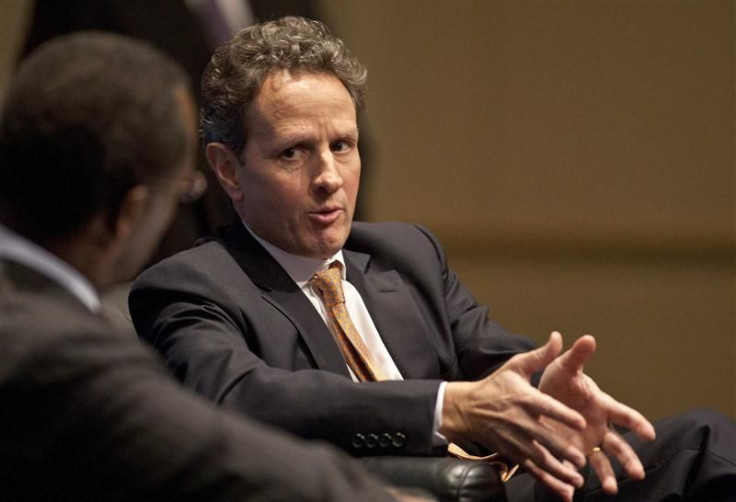Geithner Media Tour Unlikely To Silence LIBOR Critics
ANALYSIS

U.S. Treasury Secretary Timothy Geithner's appearance on a CNBC-sponsored conference this week in which he toed the government's party line that the New York Fed is not to blame for helping keep the LIBOR rate-fixing scandal under wraps -- even though they knew it was going on since at least 2007 -- is unlikely to mollify critics.
[LIBOR refers to the London Interbank Offered Rate, a benchmark interest rate that is used globally to set the cost of billions of dollars in loans.]
Geithner, leaning back on an overstuffed leather chair as he talked Wednesday to CNBC host Larry Kudlow, said the Federal Reserve Bank of New York, where he was president in 2007 as Barclays traders told people there of massive manipulation in the interest rate markets, acted very early in response to concerns that the processes that set this rate was impaired and flawed and vulnerable to misrepresentation.
Geithner said he took the issue to brief the entire U.S. regulatory committee on this at a very early stage, Geithner added, saying he brought it to the attention of the British and took the exceptional step in putting in writing to them a detailed set of recommendations that revealed the extent of the concerns in that context.
Those comments are only likely to further add to the dissonance seen between what the Fed has done so far on LIBOR and what it says it has done.
On Friday, the central branch bank responded to a Congressional request by releasing a trove of documented communications between the institution and traders at British banking giant Barclays Plc, which clearly showed the financiers warning central bank economists about the manipulation of the LIBOR interest rate at least as far back as 2007. The Fed also released email communications between that monetary agency and the Bank of England, which showed Geithner sending recommendations to his British counterparts on how to reform the LIBOR rate-setting system so as to make it more credible.
Among other things, transcripts of conversations between economists at the bank's Markets Group and traders at Barclays show Fed officials who did not react when told about how the rate-setting process was totally out of whack with reality, instead focusing exclusively in asking the banks about what they could do to help them survive the crisis. Another conversation, between an unnamed trader and Fed economist Fabiola Ravazzolo, which showed Ravazzolo didn't understand the dynamics of LIBOR when first talking to the Barclays trader, and then was sympathetic when the trader told her Barclays was engaging in market manipulation so we just fit in with the rest of the crowd.
The response to the Fed's data dump Friday was immediate.
We are ... troubled by allegations that US and foreign bank regulators may have been aware of this wrongdoing for years, a dozen senior Democratic lawmakers wrote to the Department of Justice in response. Just like the banks and executives they oversee, regulators who were involved should be held to account for any failures to stop wrongdoing that they knew, or should have known about.
The Fed's response in the five days since the release had been two-fold. On the one hand, they argued LIBOR was not taken up in 2007 or soon after simply as a result of triaging. The Fed was trying to save the world economy and stabilize the banking system, not rock the boat by revealing a scandal. On the other hand, people who were in contact with bank traders were not regulators in the full sense of the word, but merely gathering market intelligence as part of the Fed's crisis response and not engaging in a criminal investigation, according to the Wall Street Journal.
That second logic has also been espoused by the man who was Geithner's boss previously, current Fed Chairman Ben Bernanke, who told Congress on Tuesday, essentially, that it wasn't the New York Fed's job to pipe up when told of fraud in global financial markets.
The responsibility of the New York Fed was to make sure that the appropriate authorities had the information, which they did, Bernanke said.
Geithner's words Wednesday went beyond simply saying the New York Fed did the best it could be expected to, to stating it took the unambigously correct course of action.
We did, again, what we felt was the most effective ... and most responsible responses. We did the right and necessary things. We did it right and we did it early, Geithner said.
One person that is unlikely to remain silent on the Fed following the latest word from Geithner is Rick Santelli, another CNBC host known for his loud, angry on-air rants. Santelli had already criticized Bernanke earlier, yelling from the middle of the Chicago Mercantile Exchange pits it was unbelieveable Bernanke had told Congress It's not my job! I don't regulate that!
© Copyright IBTimes 2024. All rights reserved.





















